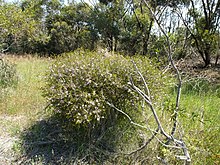Melaleuca camptoclada
| Melaleuca camptoclada | |
|---|---|

| |
| M. camptoclada in the Stirling Range National Park | |
| Scientific classification | |
| Kingdom: | Plantae |
| Clade: | Tracheophytes |
| Clade: | Angiosperms |
| Clade: | Eudicots |
| Clade: | Rosids |
| Order: | Myrtales |
| Family: | Myrtaceae |
| Genus: | Melaleuca |
| Species: | M. camptoclada
|
| Binomial name | |
| Melaleuca camptoclada F.C.Quinn
| |
Melaleuca camptoclada is a shrub in the myrtle family, Myrtaceae and is endemic to the south-west of Western Australia. It was first described in 1990 in a review of the genus Melaleuca when the species Melaleuca laxiflora at that time was found to comprise ten species. Two of those species were new - M. camptoclada and M. ctenoides.[1]
Description
Melaleuca camptoclada is a shrub growing to a height of about 3 m (10 ft). Its leaves and branches are glabrous or almost so. The leaves are 2.9–5.5 mm (0.1–0.2 in) long and 1.5–1.8 mm (0.06–0.07 in) wide and elliptical in shape.[2]
The flowers are mauve and are arranged in heads or spikes to 16 mm (0.6 in) in diameter, with 5 to 15 individual flowers. The petals are 1.5–2.4 mm (0.06–0.09 in) long and fall off as the flowers open. The stamens are arranged in five bundles around the flower with 9 to 16 stamens in each bundle. Flowering occurs from September to November and the fruit are woody capsules, 2.5–3.5 mm (0.098–0.14 in) long.[2]


Taxonomy and naming
Melaleuca camptoclada was first formally described in 1990 by F.C.Quinn from a specimen found near the Stirling Ranges.[3] The specific epithet (camptoclada) is from the Greek camptos, (flexible or curved) and clados (a shoot or branch), referring to the habit of this species.[2]
Distribution and habitat
This melaleuca occurs in the Esperance Plains, Jarrah Forest and Warren biogeographic regions.[4] It grows in gravelly sand and clay loam.[5]
Conservation status
Melaleuca camptoclada is listed as "not threatened" by the Government of Western Australia Department of Parks and Wildlife.[4]
References
- ^ Cowley, KJ; Quinn, FC; Barlow, BA; Craven, LA (1990). "Contributions to a revision of (Myrtaceae): 7–10". Australian Systematic Botany. 3 (2): 165. doi:10.1071/SB9900165. Retrieved 21 March 2015.
- ^ a b c Brophy, Joseph J.; Craven, Lyndley A.; Doran, John C. (2013). Melaleucas : their botany, essential oils and uses. Canberra: Australian Centre for International Agricultural Research. p. 111. ISBN 9781922137517.
- ^ "Melaleuca camptoclada". APNI. Retrieved 21 March 2015.
- ^ a b "Melaleuca camptoclada". FloraBase. Western Australian Government Department of Biodiversity, Conservation and Attractions.
- ^ Paczkowska, Grazyna; Chapman, Alex R. (2000). The Western Australian flora : a descriptive catalogue. Perth: Wildflower Society of Western Australia. p. 392. ISBN 0646402439.
